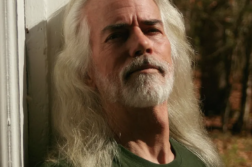CHRISTOPHER BRAM is well known for his novels, especially the one that became the acclaimed film Gods and Monsters (originally published in 1995 as Father of Frankenstein). His new book, Eminent Outlaws, is a history of gay literature in the U.S. beginning soon after World War II with Gore Vidal and The City and the Pillar (1948). Part history, part criticism, part gossip, Eminent Outlaws is a breezy survey of the landscape of gay male literature. The gossip is fun—there’s a charming report of Tennessee Williams, while riding through the London fog in a cab with Christopher Isherwood and Isherwood’s then-boyfriend, Bill Caskey, exclaiming, “We are the dreaded fog queens!”
Gore Vidal appears as a touchstone throughout the book, as do both Williams and Isherwood. Other major figures in Bram’s account include Truman Capote, James Baldwin, Allen Ginsberg, Edward Albee, Edmund White, Larry Kramer, Armistead Maupin, Mart Crowley, and Tony Kushner. Bram’s brief, incisive readings of their works are often provocative: he characterizes Angels in America as “primarily a shaggy dog story or, more appropriately, a shaggy God story.” Other gay writers, such as Charles Ludlam, Thom Gunn, and Stephen McCauley, figure in the story as well, though in smaller roles. If this book were a movie, it would be an ensemble piece overstuffed with players, with some actors (Michael Nava and Peter Cameron, for example) making only cameo appearances.
Bram, who lives in New York City and teaches at NYU, is the author of nine novels. In addition to Father of Frankenstein, they include Gossip (1997), in which an act up member has an affair with a closeted Republican journalist, and Lives of the Circus Animals (2003), a comedy about theatre people in New York. Hold Tight (1988) centers on a gay brothel in Manhattan during World War II; Exiles in America (2006) juxtaposes two marriages, one gay and one ostensibly straight. Almost History (1992) traces the career of a gay American foreign service officer in the Philippines. In Memory of Angel Clare (1989) is a comedy of manners in which the friends of a deceased gay filmmaker try to console his younger boyfriend. The Notorious Dr. August (2000) centers on a clairvoyant pianist in the Victorian era. Bram’s debut novel, Surprising Myself (1987), was a coming-out story.
This interview with Christopher Bram was conducted by telephone last February.






